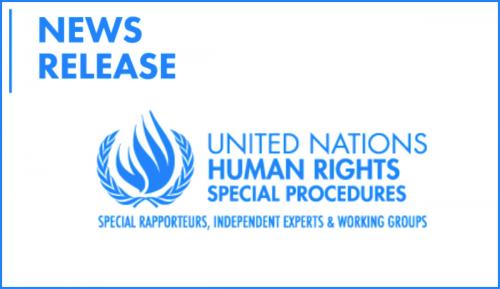Philippines: UN Human Rights experts renew call for an on-the-ground independent, impartial investigation
One year ago, 11 UN human rights experts jointly called on the Human Rights Council to establish an independent investigation into human rights violations in the Philippines. The Human Rights Council adopted Resolution 41/2 which requested the High Commissioner for Human Rights to prepare a comprehensive written report on the situation of human rights in the Philippines and to present it at its 44th session.
“The report, issued on 4 June 2020, confirmed our findings and warnings issued over the last four years: widespread and systematic killings and arbitrary detention in the context of the war on drugs, killings and abuses targeting farmers and indigenous peoples, the silencing of independent media, critics and the opposition. The report recognises important efforts to improve the protection of economic and social rights and stresses that these efforts should be guided by a human rights-based approach and focused on “leaving no one behind”. The reports also finds, as we had, stark and persistent impunity,” UN experts said today.
“Given the scale and seriousness of the human rights violations, we renew our call on the Human Rights Council to establish an on-the-ground independent, impartial investigation into human rights violations in the Philippines.”
The experts highlighted “the staggering cost of the relentless and systematic assault on the most basic rights of Filipinos at the hands of the Government”:
- Based on the most conservative assessment, since July 2016, 8,663 people have been killed in the war on drugs and 223,780 “drug personalities” arrested, with estimates of triple that number.
- At least 73 children were killed during that period in the context of a campaign against illegal drugs. Concerns have also been raised about grave violations against children committed by State and non-State actors in the context of military operations, including the recruitment and use of children in combat or support.
- The lasting economic harm and increased poverty among the children and other family members of those killed is likely to lead to further human rights violations.
- At least 208 human rights defenders, journalists and trade unionists, including 30 women, plus at least 40 legal professionals had been killed since 2015, many of whom were working on politically sensitive cases or advocating for land and environmental rights of farmers and indigenous peoples and housing rights of the urban poor.
- The Securities and Exchanges Commission in 2018 revoked the license of a prominent news website Rappler and its CEO, Maria Ressa, has been arrested multiple times on various charges and found guilty of cyber libel.
- On 5 May 2020, President Duterte’s government ordered the shut-down of ABS-CBN, the country’s largest TV and radio network, after years of explicit threats from the President in part because of its critical reporting on the “war on drugs”.
- There has been no accountability whatsoever for the multiple human rights and humanitarian law violations, limited follow-up on transitional justice and reconciliation in the Bangsamoro Autonomous Region of Muslim Mindanao; independent investigations by local institutions have been thwarted; many in the opposition silenced, including Senator Leila Norma Eulalia de Lima imprisoned since 24 February 2017.
- President Duterte ordered the country’s withdrawal from the International Criminal Court after the tribunal launched a preliminary examination of crimes against humanity committed in the context of the “war on drugs” in 2018.
“COVID-19 has further accelerated the downward spiral of the human rights situation in the Philippines. Police and the military have used violence and lethal force to enforce a quarantine imposed without due consideration for the situation of the poorest and most vulnerable communities,” the experts said. “In response to the protests of poor Filippinos demanding food aid amid the COVID-19 lockdown, President Duterte reportedly authorized police and security forces to kill protesters saying: ‘Do you understand? Dead. Instead of causing trouble, I’ll send you to the grave’.”
The report issued by the OHCHR has found many examples of such rhetoric and concluded that it could amount to incitement to violence and may be in violation of the ICCPR’s prohibition on arbitrary deprivation of life.
The experts warned that the Philippine Government’s attempt to fast track a new Anti-Terrorism Bill will further dilute human rights safeguards, by justifying the arrests of human rights defenders and government’s critics, authorising lengthy detention based on warrantless arrests, wiretapping and other surveillance for extended periods of time.
“The response of the international community must set an example. The OHCHR report should not be the end of international commitment but a milestone marking the beginning of real accountability, redress for the victims and a definite end to the very serious violations committed.
“The human rights situation in the Philippines has now reached a level of gravity requiring a robust intervention by the UN. The Human Rights Council must do everything in its power to prevent the continuation of widespread and systematic human rights abuses against the Philippines people.”
The experts urged the Human Rights Council to:
- Establish an on-the-ground international investigation into the human rights situation in the Philippines
- Strengthen the OHCHR mandate to continue its monitoring and reporting on the human rights violations in the Philippines
- Call on the ICC to expedite and prioritize the completion of its preliminary examination of the situation in the Philippines
“We call on the Government of the Philippines to demonstrate real and credible progress toward accountability by engaging with the OHCHR and developing an action plan towards the implementation of the OHCHR Report recommendations. We stand ready to provide technical assistance and advice to the Government and the OHCHR.
“We call on Member States to initiate, whenever possible, governmental sanctions and criminal prosecution against individual Philippine officials who have committed, incited or failed to prevent human rights abuses.”
RM12.50 / month
- Unlimited access to award-winning journalism
- Comment and share your opinions on all our articles
- Gift interesting stories to your friends
- Tax deductable
